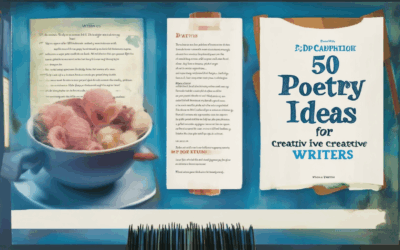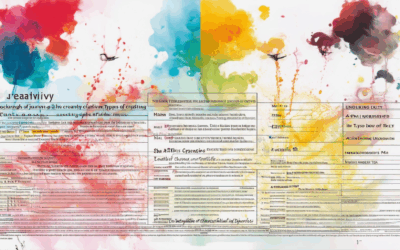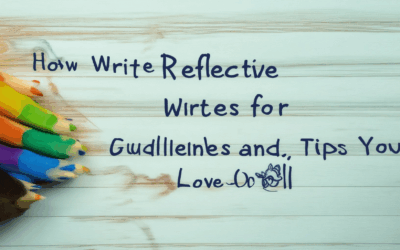Literary reflections for poets offer a transformative lens through which the essence of poetry can be illuminated. At its core, poetry is a medium of expression and introspection, allowing writers to delve deep into their thoughts and emotions. For poets, the act of reflecting on their craft can be both a challenge and a gift, offering insights that elevate their work to new heights. Whether it’s exploring the power of imagery, mastering metaphors, or discovering the motivation behind their creations, literary reflections provide a roadmap for growth and innovation. Have you ever pondered the significance of theme in your poetry, or questioned how reflection might enhance your character profiles? This exploration delves into these questions and more, providing practical advice and inspiration for poets eager to refine their craft. Through thoughtful analysis and real-world applications, this guide empowers writers to embrace the beauty of their artistry while fostering a deeper connection with their audience.
Key Takeaways
- Explore diverse poetry forms to expand your creative horizons and express emotions uniquely.
- Engage with literature by reading widely to gain insights into techniques and thematic approaches.
- Journal daily to build vocabulary, capture ideas, and foster a richer understanding of the world.
- Connect with your surroundings to spark vivid imagery and emotion in your poetry.
- Collaborate with fellow poets for support, feedback, and new perspectives.
- Set creative challenges to push boundaries and discover unexpected avenues for expression.
- Reflect on personal experiences to translate life events into universal truths and shared emotions.
- Experiment with language to break free from conventions and achieve poetic breakthroughs.
- Seek motivation from success stories to stay driven during challenging times.
- Stay curious and open-minded to capture the beauty and wonder of the world in verse.
- Embrace diverse inspirations from various sources to fuel your creativity.
- Set clear goals to maintain focus and achieve meaningful milestones.
- Join poetry communities for support, feedback, and a sense of belonging.
- Experiment freely to evolve your style and embrace failure as part of growth.
- Find your niche to deepen your passion and ensure your poetry reflects your genuine self.
- Submit to reputable platforms to gain exposure and credibility.
- Build a portfolio on sites like Silken Drum to showcase your talent effectively.
- Develop an online presence with a personal website or blog for easy discovery.
- Network and collaborate to uncover opportunities and build lasting connections.
- Leverage social media to share your work and engage with poetry enthusiasts.
- Write consistently and seek feedback to refine your craft and improve.
- Promote through interviews and guest blogging to share your unique perspective.
- Stay persistent and adapt to achieve long-term success and recognition.

What is a Poetic Reflection?
A poetic reflection is a collection of poems that delve deeply into personal thoughts, emotions, and experiences. These works often serve as a means of introspection, allowing the author to explore complex ideas, feelings, and perspectives through the lens of poetry. Unlike traditional poetry, which may focus on specific themes or narratives, a poetic reflection tends to be more introspective and personal.
Purpose and Significance
The primary purpose of a poetic reflection is to provide a space for self-expression and emotional exploration. By examining life’s complexities, challenges, and beauties, authors aim to connect with readers on a profound level. This form of poetry often resonates with others who have shared similar journeys, offering comfort and insight.
Common Themes
Poetic reflections frequently explore themes such as:- Nature : The beauty and power of the natural world.- Love : The depths of romantic relationships, loss, and longing.- Self-Discovery : The journey of self-awareness and personal growth.- Social Issues : Addressing contemporary concerns and societal challenges.
Examples of Exploration
Authors often use vivid imagery and metaphorical language to convey their thoughts. For instance, a poem might depict a journey through a stormy sea to symbolize overcoming adversity, or describe a sunset to evoke feelings of nostalgia and change.
Platforms for Publication
Silken Drum is a platform that celebrates creative expression, offering a space for writers to share their poetic reflections. Like other platforms such as Poetica, The Poetry Society, and Rattle, we encourage diversity in voices and styles, providing opportunities for dialogue and inspiration among writers and readers.
By exploring these elements, poetic reflections continue to play a vital role in literature, offering unique insights into the human condition and fostering connections between creators and audiences.
Great Quotes About Poets
Poetry is the art of turning the ordinary into the extraordinary, and poets are the architects of emotion and imagination.
- “A poem is a little world made of words.” – Anonymous
- “Poetry is the soul of man speaking through the ages.” – Plato
- “A poet is born not with a gift, but with a curse.” – T.S. Eliot
- “Poetry is the mirror of the divine spirit.” – Dante Alighieri
- “In a poem, there is truth, and in that truth, there is beauty.” – Anonymous
- “Poetry is the highest form of art because it combines rhythm, rhyme, and meaning in a way that transcends mere communication.” – Anonymous
- “A poem is a fragile thing, a bubble that the heart generates.” – Rainer Maria Rilke
- “Poetry is the art of expressing thoughts that cannot be expressed otherwise.” – Anonymous
- “The function of poetry is to quiet the noise of life and let the deeper self speak.” – Anonymous

Reflection in Poetry
Reflection in poetry refers to the process of interpreting and responding to a poem through analysis, personal insight, and emotional engagement. It involves delving deep into the imagery, themes, and underlying meanings of the words to uncover the poet’s intentions and evoke a personal response.
Purpose of Reflection
The primary aim of reflection in poetry is to go beyond the literal meaning of the words to uncover the deeper truths, emotions, and ideas that the poet is conveying. Reflective reading allows readers to connect with the poem on a profound level, often leading to a richer understanding of both the work and oneself.
Characteristics of Good Reflection
A meaningful reflection on poetry demonstrates several key qualities:
- Clarity: The ability to articulate observations and interpretations clearly.
- Depth: Going beyond surface-level analysis to uncover underlying themes and implications.
- Personal Connection: Connecting the poem to one’s own experiences and feelings.
- Critical Thinking: Analyzing the poem’s structure, language, and historical context.
How to Analyze a Poem
To reflect effectively on a poem, consider the following steps:
- Observe Details: Notice sensory images, symbols, and recurring motifs.
- Interpret Meaning: Explore how these elements contribute to the poem’s overall theme and message.
- Connect Personally: Reflect on how the poem resonates with your own life experiences and emotions.
Common Themes in Poetry Reflection
Many poems invite reflection on universal themes such as:
- Nature and the natural world
- The human condition
- Existence and mortality
- Love, loss, and relationships
Tips for Effective Reflection
To enhance your reflection on poetry:
- Practice Introspection: Ask yourself questions about the poem’s impact and significance.
- Engage with the Language: Pay attention to diction, rhythm, and meter.
- Consider Historical Context: Research the poet’s background and the poem’s origins.
- Revisit the Poem: Return to the poem after some time to gain fresh insights.
The Role of Emotion and Intuition
Reflection in poetry is deeply influenced by emotion and intuition. These elements enable readers to transcend the text and discover personal meanings that may not be immediately apparent. A truly reflective response often feels authentic and heartfelt, as it draws from the reader’s unique perspective.
Benefits of Reflecting on Poetry
Reflecting on poetry offers numerous benefits, including:
- Enhanced understanding of literary works
- Deepened appreciation for poetic devices
- Personal growth and self-discovery
- Improved critical thinking and analytical skills
By approaching reflection thoughtfully and intentionally, readers can unlock the rich layers of meaning in poetry and foster a more meaningful connection with the works they encounter.

How to Find Inspiration as a Poet
Finding inspiration as a poet can be a transformative experience, allowing you to tap into your creative potential and unlock new dimensions of expression. Here are some effective strategies to ignite your poetic spark:
- Explore Diverse Forms of Poetry : Experiment with various poetic structures, such as sonnets, haiku, free verse, and prose poetry. Each form offers unique opportunities to express emotions and ideas differently, broadening your creative horizons.
- Engage with Literature : Read widely across different genres and cultures. By immersing yourself in the works of established poets, you can gain insight into their techniques and thematic approaches, inspiring your own unique style.
- Journal Your Thoughts : Keep a poetry journal to document daily observations, emotions, and ideas. Over time, this habit will foster a richer vocabulary and deeper understanding of the world around you, serving as a wellspring of inspiration.
- Connect with Your Environment : Pay attention to your surroundings and observe details that resonate with you. Whether it’s the changing seasons, the rhythm of city life, or the quiet moments in nature, these elements can often spark vivid imagery and emotion in your poetry.
- Collaborate and Share : Join poetry communities or groups to share your work and receive feedback. Engaging with fellow poets can expose you to new perspectives and ideas, fueling your creativity and providing a sense of belonging.
- Set Personal Challenges : Challenge yourself to write poetry on specific themes or constraints. This exercise can push your boundaries, forcing you to think creatively and discover unexpected avenues for expression.
- Reflect on Life Experiences : Consider how personal events, relationships, and reflections contribute to your art. Translating these experiences into poetry allows you to convey universal truths and evoke shared emotions.
- Experiment with Language : Play with words, metaphors, and similes to explore new ways of expressing concepts. Breaking free from conventional language can lead to breakthroughs in your poetry.
- Seek Motivation from Success Stories : Reading about how other poets overcame challenges or achieved success can inspire you to persist through difficult periods. Their journeys may mirror your own, offering reassurance and guidance.
- Stay Curious and Open-Minded : Approach every day with curiosity and an open mind. The world is full of beauty, complexity, and wonder, waiting to be captured in verse.
By embracing these strategies, you can cultivate a dynamic and evolving practice that thrives on exploration, discovery, and growth. Remember, inspiration is not a finite resource—it’s a journey that rewards persistence and dedication.
How Do Poets Get Motivated to Write?
Poets find motivation through various strategies that fuel their creativity and drive. Here are some effective approaches:
- Embrace Inspiration : Poets often draw from diverse sources. Reading widely, whether fiction, memoirs, or news, can spark ideas and provide fresh perspectives. Listening to music, attending art shows, or exploring nature can also inspire new thoughts and emotions to channel into poetry.
- Set Clear Goals : Establishing objectives helps keep poets focused. Whether aiming to complete a poem series, experimenting with a new form, or exploring a specific theme, having goals provides direction and a sense of accomplishment.
- Connect with Communities : Joining poetry groups or forums offers support and feedback. Engaging with fellow writers can foster motivation through shared experiences and constructive criticism, helping to overcome writer’s block and keep the creative momentum.
- Experiment and Evolve : Poets should feel free to explore different styles and techniques. Embracing failure as part of the learning process can reduce pressure and encourage innovation, allowing for personal growth and unique voice development.
- Find Your Niche : Discovering a specialized area or theme that resonates personally can deepen motivation. Focusing on what truly moves you ensures your poetry reflects genuine passion and intention.
By incorporating these strategies, poets can sustain their passion and productivity, continually evolving their craft and sharing their unique voices with the world. Explore our resources to discover tools and communities that can further inspire your journey.
Learn more about Silken Drum’s resources for writers .

How to Get Your Poetry Recognized
To get your poetry recognized, consider the following organized approach:
- Submit to Reputable Magazines and Competitions
- Start by submitting your poems to established literary magazines like The Poetry Review and Poetry Magazine . These platforms have a strong readership and can provide valuable exposure.
- Enter poetry competitions such as the National Poetry Competition hosted by the Poetry Society. Winning or being shortlisted can significantly boost your credibility.
- Build a Portfolio and Online Presence
- Create a portfolio of your best work to showcase your talent. Consider publishing it on platforms like Silken Drum , which supports creative writers and offers a space to share your poetry.
- Develop a personal website or blog using platforms like WordPress or Wix. Include a bio, portfolio, and contact information to make it easier for others to discover and engage with your work.
- Network and Engage with the Community
- Attend poetry readings, workshops, and events to connect with other writers and poetry enthusiasts. This networking can lead to collaborations and opportunities.
- Join online communities on platforms like Facebook and Reddit to participate in discussions and find like-minded individuals who share a passion for poetry.
- Leverage Social Media
- Share your poetry on social media platforms such as Twitter and Instagram. Post short poems or impactful quotes to capture attention. Engage with other poets and use relevant hashtags to increase visibility.
- Collaborate with Other Artists
- Partner with visual artists, musicians, or writers to create joint projects, such as poetry books or art installations. This collaboration can attract a broader audience and enhance your work’s impact.
- Write Regularly and Seek Feedback
- Maintain a consistent writing routine to keep your creative muscles active. Journaling can help track your progress and inspire future ideas.
- Participate in workshops or join critique groups to receive feedback and improve your poetry. Constructive criticism can offer valuable insights and help refine your craft.
- Promote Your Work Through Interviews and Guest Blogging
- Share your thoughts on poetry and writing by contributing to platforms like Medium or The Huffington Post. This can attract readers interested in your unique perspective.
- Seek out podcast interviews or radio spots to discuss your poetry and reach an even wider audience.
- Stay Persistent and Adapt
- Recognition takes time, so remain committed to your craft. Continuously submit your work and engage with the poetry community to build momentum.
- Track your submissions and apply for opportunities consistently to increase your chances of success.
By following these steps, you can systematically work towards gaining recognition for your poetry while building a strong online presence and community connections.




0 Comments